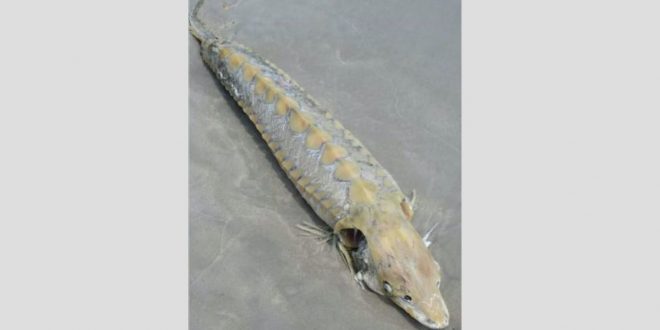A dinosaur fish has washed up on shore in North Carolina, another startling reminder that the ocean is full of evil and out to kill us all.
An article written by the North Carolina Wildlife Resources Commission explains the Atlantic Sturgeon is a primitive fish dating back to the dinosaur age.
The Atlantic sturgeon has a brown, tan or bluish-black body and a whitish belly. It has no scales, but five rows of bony plates, called scutes, cover its head and body: one along the back, one on either side and two along the belly. It grows slowly, eventually reaching 5 to 6 feet in length. Males weigh up to 90 pounds and females weigh up to 160 pounds. Its long, hard snout has an upturned tip, with four sensory barbels on the underside of its snout. Its mouth is soft and toothless.
Because of the bony plates covering its body, the Atlantic sturgeon has few natural predators. Human activities such as pollution, historic overfishing and damming of rivers threaten sturgeon.
Sturgeon are anadromous, meaning they live in the ocean and spawn in freshwater rivers. Spawning occurs from April to June in the freshwater river they were born in, with sturgeon typically only returning to spawn every 3 to 5 years. Females can lay up to 2 million eggs, which are large and black and stick to the bottom of the river. After laying their eggs, females leave their spawning areas, while males remain there until autumn. Once hatched, juveniles stay in their natal river for as long as six years before moving into the Bay’s open waters and eventually the ocean. Males do not reach sexual maturity until they are at least 10 years old, and females take nearly 20 years to mature. Atlantic sturgeon can live for more than 60 years.
Some Protections for the Atlantic Sturgeon Include:
It is illegal to fish for, catch or keep Atlantic sturgeon or its parts commercially or recreationally
Atlantic sturgeon are also protected under state laws
– check your states wildlife webpage for state regulations on Atlantic sturgeon
https://www.youtube.com/watch?v=0gWphqF6zZ8
Agencies/Canadajournal
 Canada Journal – News of the World Articles and videos to bring you the biggest Canadian news stories from across the country every day
Canada Journal – News of the World Articles and videos to bring you the biggest Canadian news stories from across the country every day




Evolution ? Apparently not.